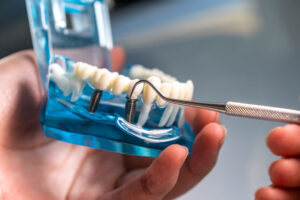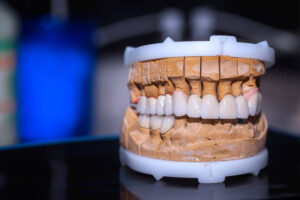Through dental implants, patients can enjoy fuller smiles after losing a tooth. To care for this restoration, patients simply need to brush their teeth and see our dentist twice a year. However, the implant can still be compromised through periodontal disease. It is paramount for all patients with implants to avoid gum disease before dangerous consequences emerge.
How Gum Disease Destroys Implants
The reason implants are so effective is that they are firmly secured within the jawbone. Through a process known as osseointegration, the titanium implant fuses with the jawbone over the course of several months to keep the abutment and crown in place. Unfortunately, that means if anything happens to compromise the integrity of the jawbone, it could impact the strength of the implant.
Initially, gum disease only manifests in symptoms affecting the gum tissue. You may notice swollen, red or tender gums. Without treatment, the bacteria can make its way to the jawbone and gradually deteriorate it over time. The success rate for dental implants is roughly 95%, but with periodontal disease, your chances of failure increase three-fold.
How To Prevent Degradation
You need to play an active role in your oral health to avoid the consequences of gum disease. For many people, the disease is asymptomatic at first. The only way to tell you have the disease is to schedule routine examinations Knellinger Dental Excellence. Our dentist will be able to tell if you have gum disease through X-rays and other tests. Even if you were unaware you had the condition, our dentist will be able to provide you with the proper treatment to restore your oral health once more.
How To Get Started
Do not wait to give our office a call if you suspect you have periodontal disease. With prompt action, our team will be able to save your gum tissue and your dental implant.




